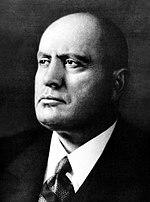| Duce of Fascism Duce del Fascismo | |
|---|---|
.svg.png) | |
| Style | His Excellency |
| Residence | Palazzo Chigi (1925–1929) Palazzo Venezia (1929–1943) Villa Torlonia (1925–1943) |
| Appointer | Grand Council of Fascism |
| Precursor | Benito Mussolini (as Prime Minister) |
| Formation | 23 March 1919 |
| First holder | Benito Mussolini |
| Final holder | Benito Mussolini |
| Abolished | 25 April 1945 |
Duce (/ˈduːtʃeɪ/ DOO-chay, Italian: [ˈduːtʃe]) is an Italian title, derived from the Latin word dux "leader", and a cognate of duke. National Fascist Party leader Benito Mussolini was identified by Fascists as Il Duce ("The Leader") of the movement since the birth of the Fasci Italiani di Combattimento in 1919. In 1925 it became a reference to the dictatorial position of Sua Eccellenza Benito Mussolini, Capo del Governo, Duce del Fascismo e Fondatore dell'Impero ("His Excellency Benito Mussolini, Head of Government, Leader of Fascism and Founder of the Empire").[1] Mussolini held this title together with that of President of the Council of Ministers: this was the constitutional position which entitled him to rule Italy on behalf of the King of Italy. Founder of the Empire was added for the exclusive use by Mussolini in recognition of his founding of an official legal entity of the Italian Empire on behalf of the King in 1936 following Italy's victory in the Second Italo-Ethiopian War. The position was held by Mussolini until 1943, when he was removed from office by the King and the position of "Duce" was dismantled, while Marshal Pietro Badoglio, 1st Duke of Addis Abeba was appointed Presidente del Consiglio.
This position was the model which other fascist leaders adopted, such as the position of Führer by Adolf Hitler and Caudillo by Francisco Franco. In September 1943, Mussolini styled himself as the "Duce of the Italian Social Republic" (Italian: Duce della Repubblica Sociale Italiana), and held the position until the collapse of the Italian Social Republic and his execution in April 1945.[2]
History of the term
The title was used outside its traditional noble sense in some of the publications praising Garibaldi during the Italian unification in 1860 , though not taken up officially by Garibaldi himself.[3]
'Duce Supremo' ("Supreme Leader") was more formally used by Victor Emmanuel III in 1915, during World War I, referring to his role as the commander in chief of the armed forces. The term was also used by Gabriele d'Annunzio as dictator of the self-proclaimed Italian Regency of Carnaro in 1920, and most significantly by the Fascist dictator Benito Mussolini. The first record of the term being used in reference to Mussolini dates to a banquet held in his honor in Forlì in 1912, celebrating his new position as editor-in-chief of Avanti!.[4]
Because the title 'Il Duce' has become associated with Fascism, it is no longer in common use other than in reference to Mussolini. Because of modern anti-fascist sentiment, Italian speakers in general now use other words for leader, mainly including the English loanword. However, the term duce survives as an antonomasia for Benito Mussolini.
Succession
Mussolini intended that the Grand Council of Fascism would choose a successor from a list of three men chosen by him, and submit the name for approval by the king. As of 1940 he may have been preparing his son-in-law Galeazzo Ciano for the role.[5]
List
| Portrait | Duce (Born–Died) | Took office | Left office | Tenure | Party | |
|---|---|---|---|---|---|---|
.jpg) | Benito Mussolini (1883–1945) | 23 March 1919 | 9 November 1921 | 26 years, 33 days | Italian Fasces of Combat | |
| 9 November 1921 | 25 July 1943 | National Fascist Party | ||||
| 23 September 1943 | 25 April 1945 | Republican Fascist Party | ||||
See also
- Caudillo
- Conducător
- Doge
- Führer
- Poglavnik
- Roman dictator
- Tenno
- Strongman (politics)
- Supreme Leader (disambiguation)
- Vozhd
References
- ^ Image Description: Propaganda poster of Benito Mussolini, with caption "His Excellency Benito Mussolini, Head of Government, Leader of Fascism, and Founder of the Empire ...".
- ^ Quartermaine, L. (2000). Mussolini's Last Republic: Propaganda and Politics in the Italian Social Republic. p. 21
- ^ Lucy Riall, "Garibaldi, Invention of a Hero", London, 2007, Ch. 9
- ^ Mussolini's Italy: Twenty Years of the Fascist Era. Max Gallo.
- ^ Gunther, John (1940). Inside Europe. New York: Harper & Brothers. pp. 255, 257–258.
